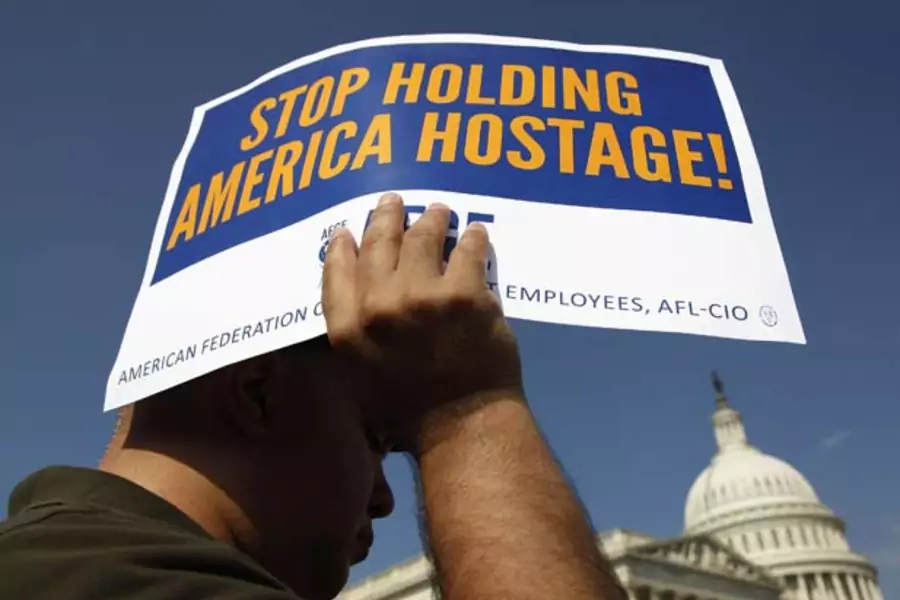The World Next Week: Debt Debate Continues, Iran Talks Convene in Geneva, the African Union Discusses the ICC, and Saudi Arabia Faces MERS Fears

The World Next Week podcast is up. Bob McMahon and I discussed the ongoing debt ceiling debate, negotiations in Geneva on Iran’s nuclear program, the African Union summit in Ethiopia, and Saudi Arabia’s preparations during the hajj for a potentially deadly virus.
[audio: http://www.cfr.org/content/publications/media/editorial/2013/20131010_T…]
The highlights:
- The October 17th debt ceiling deadline is fast approaching. The news out of Washington today suggests that the impasse on Capitol Hill is starting to break just a bit; House Republican leaders offered to increase the debt limit through November 22 in exchange for a White House agreement to negotiate a longer-term tax and spending deal. Assuming that the White House accepts the offer and that Speaker of the House John Boehner can persuade his caucus to endorse his proposal, the move buys Washington six weeks to settle its differences on fiscal policy. Whether Washington can make good use of that time is debatable. Democrats continue to insist that tax increases must accompany any further spending cuts, and Republicans continue to insist on spending cuts alone. That does not sound like a recipe for agreement. So there’s a good chance that the debt ceiling debate will resemble the directions on the back of shampoo bottles—wash, rinse, and repeat.
- African leaders will gather in Ethiopia in the coming week for the African Union’s annual summit meeting. The headline issue on the agenda is the International Criminal Court. The ICC has become increasing controversial across Africa. Many Africans argue that the ICC is quick to put Africans on trial—Kenyan President Uhuru Kenyatta is currently being tried for crimes against humanity—while it ignores leaders elsewhere in the world who have blood on their hands. This perceived double standard is eroding the willingness of many African countries to cooperate with the ICC.
- Representatives from the P5+1 countries—the permanent members of the UN Security Council plus Germany—are scheduled to meet in Geneva next Tuesday and Wednesday with Iranian officials to discuss Iran’s nuclear program. The meeting will provide the first opportunity to test the sincerity of the positive words coming out of Tehran over the last month. Even if Tehran matches words with deeds, it won’t be easy to reach an agreement that sticks. Iranian hardliners have bitterly criticized Iranian president Hassan Rouhani’s conciliatory words, and Ayatollah Ali Khamenei has said publicly that some of Rouhani’s actions while in the United States last months were “inappropriate.” Meanwhile, many lawmakers on Capitol Hill doubt that the Iranian overture is genuine and are seeking to ratchet up rather than scale back sanctions on Iran. So any deal struck in Geneva or elsewhere could be a very tough sell back home.
- Muslims from around the world are preparing for the annual pilgrimage to Mecca next week. With millions of people expected to visit Islam’s holiest city, concerns about the spread of MERS—Middle East Respiratory Syndrome virus—have increased. The disease, which was first reported in Saudi Arabia last year, is deadly; in the initial wave of infections killed nearly half the people who contracted it. The disease is spread by close contact, though fortunately, so far it does not appear to spread easily. Still, the virus is not entirely understood, and scientists and medical authorities will be closely monitoring the situation.
- Bob’s Figure of the Week is Janet Yellen. My Figure of the Week is $260 million. Our audience-nominated Figure of the Week comes from TWNW listener @NazilaVa who picked 60 percent. As always, you’ll have to listen to the podcast to find out why.
For more on the topics we discussed in the podcast check out:
Debt Ceiling: The Washington Post reports that Republicans are offering a short-term debt ceiling increase. CFR.org had a backgrounder on the costs and consequences of not raising the debt ceiling. Politico writes about the Democratic negotiating strategy.
African Union and the ICC: Voice of America explains why the AU may seek deferral of Kenyan president Kenyatta’s case. Al-Jazeera explains why Kenyatta will not attend his trial in the Hague. BusinessDay writes that Kenya has denied accusations that it is lobbying for AU members to leave the ICC. Amnesty International argues that African states should not withdraw from the ICC.
Iran Talks: Ray Takeyh describes the domestic politics driving Iran’s diplomatic shift. Richard Haass writes that successful diplomacy will be challenging for both Iran and the United States. USA Today highlights goals for the upcoming talks in Geneva. The Associated Press reports that Iran may use its excess uranium as a bargaining tool.
MERS and the Hajj: The Huffington Post writes that the hajj comes with health concerns every year. The National describes the difficulties in containing the MERS virus. Yahoo! News confirms recent deaths from MERS at the hajj. The Center for Disease Control explains MERS and its dangers.
 Online Store
Online Store